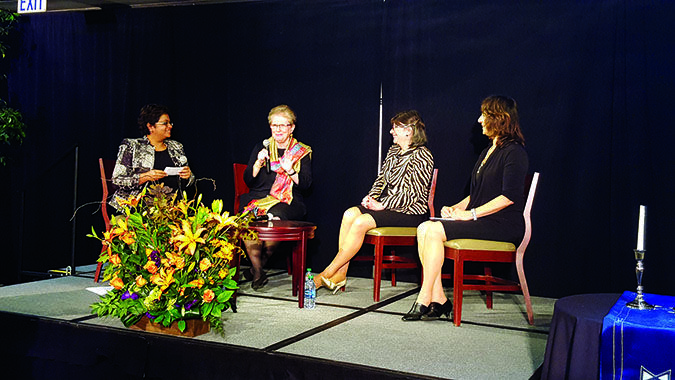In an interfaith celebration of the 50th anniversary of Nostra Aetate — the 1965 Vatican II declaration rejecting anti-Semitism — Catholic and Jewish followers from across greater Los Angeles participated in “A Jubilee for Nostra Aetate” two-part conference that kicked off Nov. 9 with an evening of dialogue at Loyola Marymount University.
The gathering began with a musical choral performance commemorating the Nov. 9 anniversary of Kristallnacht, Nazi Germany’s deadly attacks on Jews in 1938. The musical portion was followed by the three-part dialogue, titled “The Vatican II Revolution: The Ongoing Struggle for Jewish-Catholic Reconciliation,” which explored how effectively Nostra Aetate has been understood and put into practice among Church officials, theologians and people “in the pews” alike.
Cosponsored by the Bellarmine College of Liberal Arts and the Martin Gang Institute, the interfaith presentation featured two renowned scholars on Jewish-Catholic relations: Amy-Jill Levine, a professor at Vanderbilt Divinity School and College of Arts and Sciences, and author/coeditor of several books, including “The Misunderstood Jew: The Church and the Scandal of the Jewish Jesus”; and Holy Names of Jesus and Mary Sister Mary C. Boys, dean of academic affairs and professor of theology at Union Theological Seminary, and an adjunct faculty member of the Jewish Theological Seminary of America. She has authored books on Catholic-Jewish relations, most recently “Redeeming Our Sacred Story: The Death of Jesus and Relations between Jews and Christians.”
“[Nostra Aetate] is an imperfect declaration … but I want to lift up some things that 50 years later speak very profoundly to us,” said Sister Boys, who went on to list five elements from the document “that I think speak to us in our time.”
They include the fact that Nostra Aetate: (1) made new assertions; (2) launched a movement of reconciliation fundamental to the Church’s moral integrity; (3) served as a catalyst for other Christian traditions vis-à-vis the Jewish people; (4) issued a call to engage with the “other”; and (5) it manifested a sign of hope to the world.
Among the document’s “new assertions” was that “other religions have elements that are true and holy, reflecting a ray of truth that enlightens all people,” she said.
“This was the first time in the history of the Catholic Church that such a high-ranking body has even admitted that there is truth in other religious traditions,” explained Sister Boys.
Another then-new assertion that reverberates today is that “Catholics should enter with prudence and charity into dialogue and collaboration with people of other religious traditions,” she said, noting that the primary purpose of dialogue is not only talking to each other, but also listening and learning from one another.
Levine agreed that continued two-way dialogue is an essential tool for recognizing the many “bridges” that unite the Catholic and Jewish faith traditions, rather than focusing on real or perceived “divisions” between the two groups.
“After 2,000 years of ignorance, the time has come for church and synagogue, Jew and Catholic, to understand our intertwined histories, to see Jesus as a Jew who made sense to other Jews in a Jewish context — because the New Testament is Jewish history — to learn how our two traditions came to parting of the ways, to celebrate both our differences as well as our similarities, and to work together for the shalom … that both traditions proclaim,” said Levine.
The two-part conference continued on Nov. 11 at the Cathedral of Our Lady of the Angels in Downtown Los Angeles, where hundreds of participants were in attendance for the 39th annual Catholic-Jewish Women’s Conference (CJWC), dubbed “From Estrangement to Sisterhood: Walking Forward Together.” The conference brought together Catholic and Jewish women and others who support interreligious dialogue to address “Why Nostra Aetate still matters” in 2015.
The guest speakers included Holli Levitsky, chairperson of the LMU Jewish Studies Program; and Susan Abraham, assistant professor of Theological Studies at the LMU Bellarmine College of Liberal Arts. Their presentations were followed by Q&A and group discussions, where participants addressed how the CJWC can support continued communication and greater mutual understanding, identify contemporary obstacles that impede progress, and what work still needs to be done to fully embrace and expand upon Nostra Aetate.

